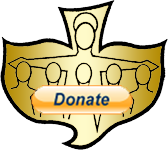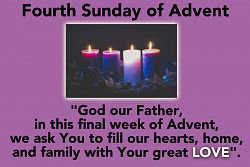|
|
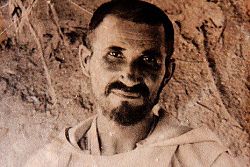 French.
French.1858-1916 Born to an aristocratic family; orphaned by age six, he and his sister Mary were raised by their grandfather. Studied at Jesuit schools in Nancy and Paris, France from 1872 to 1875. Entered the Saint-Cyr Military Academy in 1876. Joined the 4th Hussar regiment; in 1880 his unit was sent to Setif, Algeria. He was discharged from the service in March 1881 for misconduct, and moved to Evian, France. During the Revolt of Bon Mama in South Oran two months later, Charles re-enlisted, and fought for the eight months of the rebellion. He became so fascinated with the Arabs that he met that when he could not obtain a leave of absence to study them, he resigned his commission. He spent 15 months learning Arabic and Hebrew, and then traveled into Morocco. In May 1885 he received the Gold Medal of the French Geographic Society for his work. He explored Algeria and Tunisia from September 1885 through January 1886, returning to Paris in February to work on his book Reconnaissance au Maroc, which was published in 1888. He lived very simply, sleeping on the floor, spending hours each day in prayer at home and in church. Pilgrim to the Holy Lands from November 1888 to February 1889, and spent much of the rest of 1889 in spiritual retreats. On 16 January 1890 he joined the Trappist monks at the monastery of Notre Dames-des-Neiges, taking the name Brother Marie-Alberic; he moved to the monastery of Akbes, Syria in June. Sent to study in Rome in October 1896, but after three months it became obvious that his heart, head and spirit were elsewhere, and he was released from his vows. He made multiple pilgrimages through the Holy Lands on foot before returning to France to study for the priesthood. Ordained on 9 June 1901 at Viviers. He moved to the Oran region near Morocco in late 1901 to establish a base and found an order to evangelize Morocco. In 1902 he began a program of buying slaves in order to free them. In 1904 he began evangelizing nomadic Tauregs in the area of south and central Sahara. Translated the Gospels into the language of the Tauregs. In November 1908 he translated Taureg poetry to French, and he spent years compiling a Taureg lexicon. In March 1909 he succeeded in founding the Union of Brothers and Sisters of the Sacred Heart to evangelize the French colonies in Africa. Killed when caught in the middle of combat between French forces and Arab insurrectionists. Born to an aristocratic family; orphaned by age six, he and his sister Mary were raised by their grandfather. Studied at Jesuit schools in Nancy and Paris, France from 1872 to 1875. Entered the Saint-Cyr Military Academy in 1876. Joined the 4th Hussar regiment; in 1880 his unit was sent to Setif, Algeria. He was discharged from the service in March 1881 for misconduct, and moved to Evian, France. During the Revolt of Bon Mama in South Oran two months later, Charles re-enlisted, and fought for the eight months of the rebellion. He became so fascinated with the Arabs that he met that when he could not obtain a leave of absence to study them, he resigned his commission. He spent 15 months learning Arabic and Hebrew, and then traveled into Morocco. In May 1885 he received the Gold Medal of the French Geographic Society for his work. He explored Algeria and Tunisia from September 1885 through January 1886, returning to Paris in February to work on his book Reconnaissance au Maroc, which was published in 1888. He lived very simply, sleeping on the floor, spending hours each day in prayer at home and in church. Pilgrim to the Holy Lands from November 1888 to February 1889, and spent much of the rest of 1889 in spiritual retreats. On 16 January 1890 he joined the Trappist monks at the monastery of Notre Dames-des-Neiges, taking the name Brother Marie-Alberic; he moved to the monastery of Akbes, Syria in June. Sent to study in Rome in October 1896, but after three months it became obvious that his heart, head and spirit were elsewhere, and he was released from his vows. He made multiple pilgrimages through the Holy Lands on foot before returning to France to study for the priesthood. Ordained on 9 June 1901 at Viviers. He moved to the Oran region near Morocco in late 1901 to establish a base and found an order to evangelize Morocco. In 1902 he began a program of buying slaves in order to free them. In 1904 he began evangelizing nomadic Tauregs in the area of south and central Sahara. Translated the Gospels into the language of the Tauregs. In November 1908 he translated Tauareg poetry to French, and he spent years compiling a Taureg lexicon. In March 1909 he succeeded in founding the Union of Brothers and Sisters of the Sacred Heart to evangelize the French colonies in Africa. Killed when caught in the middle of combat between French forces and Arab insurrectionists. "Father, I abandon myself into Your hands; do with me what You will. Whatever You do I thank You. I am ready for all, I accept all. Let only Your will be done in me, as in all Your creatures, I ask no more than this, my Lord. Into Your hands I commend my soul; I offer it to You, O Lord, with all the love of my heart, for I love You, my God, and so need to give myself - to surrender myself into Your hands, without reserve and with total confidence, for You are my Father." - St. Charles's Prayer of Abandonment 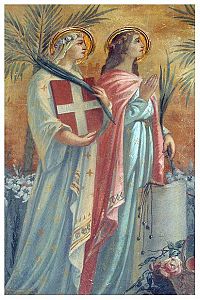 Italian.
Italian.Martyred, 361. Patroness of the City of Los Angeles Her parents, Saint Flavian of Acquapendente and Dafrosa of Acquapendente, were martyred in the persecutions of Julian the Apostate, and Vivian and her sister Demetria were turned over to a woman named Rufina who tried to force them into prostitution. Upon her continued refusal to co-operate, Vivian was imprisoned, then flogged to death. Prayer... O God, the giver of all good gifts, in Your servant Vibiana You joined the flower of virginity with the palm of martyrdom; be pleased, by her intercession, to join our souls by charity to You, so that all dangers being removed, we may obtain our eternal reward. Through our Lord Jesus Christ, Your Son, who lives and reigns with You in the unity of the Holy Spirit, for ever and ever. Amen. Saint Vibiana, pray for the City of Los Angeles! 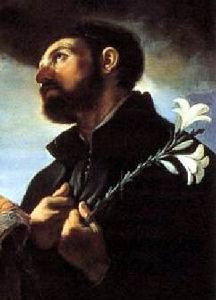 Born in Spain, 1506.
Born in Spain, 1506.Died in China from a fever, 1552 Born to the nobility of the Basque reqion. Studied and taught philosophy at the University of Paris, and planned a career as a professor. Friend of Saint Ignatius of Loyola who convinced him to use his talents to spread the Gospel. One of the founding Jesuits, and the first Jesuit missionary. Priest. In Goa, India, while waiting to take ship, he preached in the street, worked with the sick, and taught children their catechism. He would walk through the streets ringing a bell to call the children to their studies. Said to have converted the entire city. He scolded his patron, King John of Portugal, over the slave trade: "You have no right to spread the Catholic faith while you take away all the country's riches. It upsets me to know that at the hour of your death you may be ordered out of paradise." Tremendously successful missionary for ten years in India, the East Indies, and Japan, baptizing more than 40,000 converts. His epic finds him dining with head hunters, washing the sores of lepers in Venice, teaching catechism to Indian children, baptizing 10,000 in a single month. He tolerated the most appalling conditions on long sea voyages, enduring extremes of heat and cold. Wherever he went he would seek out and help the poor and forgotten. He traveled thousands of miles, most on his bare feet, and he saw the greater part of the Far East. Had the gift of tongues. Miracle worker. Raised people from the dead. Calmed storms. Prophet. Healer. Prayer by St. Francis Xavier.... "Eternal God, Creator of all things, remember that You alone has created the souls of unbelievers, which You have made according to Your Image and Likeness. Behold, O Lord, how to Your dishonor many of them are falling into Hell. Remember, O Lord, Your Son Jesus Christ, Who so generously shed His Blood and suffered for them. Do not permit that Your Son, Our Lord, remain unknown by unbelievers, but, with the help of Your Saints and the Church, the Bride of Your Son, remember Your mercy, forget their idolatry and infidelity, and make them know Him, Who You have sent, Jesus Christ, Your Son, Our Lord, Who is our salvation, our life, and our resurrection, through Whom we have been saved and redeemed, and to Whom is due glory forever. Amen."  1873-1954, born in Verona, Italy.
1873-1954, born in Verona, Italy.Canonized, April 18, 1999 by Pope John Paul II. Started a series of homes for abandoned adolescents throughout Italy. Founder of Congregation of the Poor Servants of Divine Providence. Frequent correspondent, with the author, C.S. Lewis. "Be living Gospels." - St. Giovanni Calabria 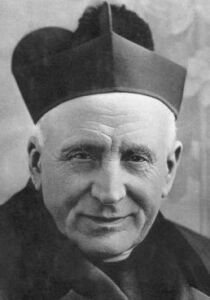 1856-1931.
1856-1931.Beatified by Pope John Paul II, April 29, 1990. Philip met Don Bosco at age 5, and apparently instinctively understood the importance of the future saint. Though he felt a call to a religious vocation, Philip was torn, and was seriously considering marriage when he decided to become a disciple of Don Bosco at age 22. The Christian Brothers immediately saw something in him, and made him an assistant novice master even before he took his vows as a Salesian on 13 August 1880. Though he had no intention to become a priest, his superiors, who saw his potential better than he did, ordered him to study and take the tests, and he was ordained on 23 December 1882. In addition to his work as novice master, Philip was placed in charge of the "late" vocations, those like himself who came to the Order as adults. Director of the Salesian community of Sarria, Spain in 1889; he opened several new houses, and brought in many new vocations. Salesian provincial director in Spain from 1892 to 1901. Began publication of Lecturas Catolicas in 1895. Helped the Daughters of Mary, Help of Christians expand in Spain. Vicar-General of the Salesians on 1 April 1901. Founded centers to minister to the daily and spiritual needs of young women. Helped found the World Federations of Past-Pupils, and assisted the Salesian Sisters. Organized the Salesian International Congress of 1911. With Zelatrici di Maria Ausiliatrice he helped found the group that would evolve into the Volunteers of Don Bosco. Rector Major of the Salesians on 24 May 1922, the third successor to Don Bosco, and the last one to have been personally trained by him. From that position he worked to bring Doc Bosco's vision to the 20th century, and the 20th century to the vision, doing all he could to spread Salesian spirituality and trust in God. He sent many young Salesians to learn foreign languages and customs so they would become more effective missionaries, and he asked Pope Pius XI to grant the "indulgence for sanctified work". He traveled extensively, preaching, encouraging vocations and the spiritual life of the laity. During his tenure the number of Salesians went from 6,000 to 10,000, there were 250 new houses and centers opened, and his teacher Don Bosco was recognized as a saint. "What must you do to have life? Before all else, the first thing you have to do is pray for courage every day to carry the cross the Lord has assigned you. Then let each of you do your own work really well, the work proper to your state, as God wants it, and according to your condition, which means according to the spirit of the Lord and of Don Bosco." - Blessed Philip Rinaldi 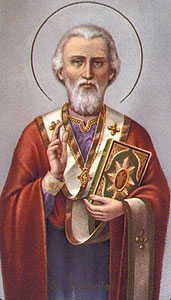 Died, c. 346 in Myra, Lycia (now modern Turkey)
Died, c. 346 in Myra, Lycia (now modern Turkey)Priest. Abbot. Bishop of Myra, Lycia (modern Turkey). Generous to the poor, and special protector of the innocent and wronged. Many stories grew up around him prior to his becoming associated with Santa Claus. An example: Upon hearing that a local man had fallen on such hard times that he was planning to sell his daughters into prostitution, Nicholas went by night to the house and threw three bags of gold in through the window, saving the girls from an evil life. These three bags, gold generously given in time of trouble, became the three golden balls that indicate a pawn broker's shop. Prayer... God of joy and cheer, we thank you for your servant, the good bishop Nicholas. In loving the poor, he showed us your kindness; in caring for your children, he revealed your love. Make us thoughtful without need of reward so that we, too, may be good followers of Jesus. Amen. 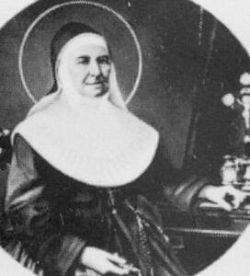 Italian.
Italian.1811-1888, Canonized by Pope Pius XII in 1949. One of nine children, her father was a potter. Born in poverty, she suffered from poor health all her life. Pious from early youth she tried to enter a religious order, but was refused admission due to her health and lack of dowry. The pious, childless couple she worked for could have given her a dowry, but would not because they did not want to lose her as member of their family. Franciscan tertiary at age 16. Her bishop knew of her skill in teaching the faith to girls, and in 1837 he gave her a house which she and three other young women made into two classrooms. From this humble beginning came the Institute of the Daughters of Mercy in 1837 under the protection of Our Lady of Mercy and Saint Joseph, groups devoted to teaching the young, and caring for the sick. Any deserving girl would be accepted into the community, even without a dowry. Mary Joseph served as superior of this band of teachers for over 40 years. In 1875 they opened their first house in the Americas at Buenos Aires, Argentina. Josepha's success and personal holiness were such that her bishop, over strong objection from many, allowed her to organize a group that encouraged vocations to the priesthood. "The hands should be at work, the heart with God." - Saint Mary Joseph Rosello 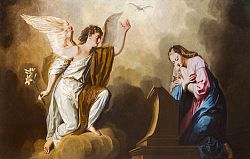 The Blessed Virgin Mary was preserved from the stain of original sin in the first instant of her conception in the womb of her mother. This was a singular privilege and grace of God, granted in view of the merits of Jesus Christ. By her conception is meant not the act or part of her parents in it, nor the formation of her body, nor the conception of Christ later in her own womb; from the moment her soul was created and infused into her body, it was free from original sin and filled with sanctifying grace. Her soul was never stained by original sin, nor by the depraved emotions, passions, and weaknesses consequent on that sin, but created in a state of original sanctity, innocence, and justice. She had at least the graces of the first Eve before the Fall and more. This privilege was befitting the one who was to be mother of the Redeemer.
The Blessed Virgin Mary was preserved from the stain of original sin in the first instant of her conception in the womb of her mother. This was a singular privilege and grace of God, granted in view of the merits of Jesus Christ. By her conception is meant not the act or part of her parents in it, nor the formation of her body, nor the conception of Christ later in her own womb; from the moment her soul was created and infused into her body, it was free from original sin and filled with sanctifying grace. Her soul was never stained by original sin, nor by the depraved emotions, passions, and weaknesses consequent on that sin, but created in a state of original sanctity, innocence, and justice. She had at least the graces of the first Eve before the Fall and more. This privilege was befitting the one who was to be mother of the Redeemer.The doctrine was defined by Blessed Pope Pius IX, 8 December 1854. It is in accord with the texts of Scripture (Genesis 3), "I will put enmities between thee [the serpent] and the woman, and thy seed and her seed"; (Luke 1), "Hail, full of grace." It is established by tradition, by the writings of the Fathers, by feasts observed in honor of this prerogative, by the general belief of the faithful. The very controversies over it among theologians brought about a clear understanding and acceptance of the doctrine long before it was declared by Blessed Pope Pius IX. After the declaration, some Protestant writers denounced what they styled Mariolatry (idolatry of Mary). However, there is a constantly-growing devotion among Catholics, and respect among some Protestant groups for the prerogatives of the Mother of Our Redeemer. Among the many masters who have represented the Immaculate Conception in art are: Carducci, Carreno de Miranda, Falco, Holbein, Montanes, Muller, Murillo, Reni, Ribera, and Signorelli. It is the title she used when appearing at Lourdes. The feast originated in the East about the 8th century where it was celebrated on 9 December. In the Western Church it appeared first in England in the 11th century and was included in the calendar of the universal Church in the 14th century. It has a vigil and an octave, and is a holy day of obligation in the United States, Ireland, and Scotland. Prayer to Mary Immaculate... You are all fair, O Mary; the original stain is not in you. You are the glory of Jerusalem, the joy of Israel, the honor of our people, and the great advocate of sinners. O Mary, Virgin most prudent, Mother most merciful, pray for us; intercede for us with our Lord Jesus Christ. Amen. 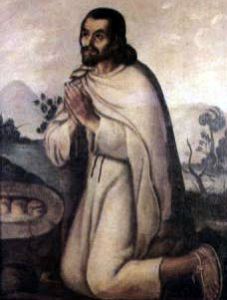 Born: 1474, Tlayacac, Cuauhtitlan (about 15 miles north of modern Mexico City, Mexico) as Cuauhtlatoatzin.
Born: 1474, Tlayacac, Cuauhtitlan (about 15 miles north of modern Mexico City, Mexico) as Cuauhtlatoatzin.Died: 1548 of natural causes. Born an impoverished free man in a strongly class-conscious society. Farm worker, field laborer, and mat maker. Married layman with no children. A mystical and religious man even as a pagan, he became an adult convert to Christianity around age 50, taking the name Juan Diego. Widower in 1529. Visionary to whom the Virgin Mary appeared at Guadalupe on December 9, 1531, leaving him the image known as Our Lady of Guadalupe. "Let not your heart be disturbed. Do not fear that sickness, nor any other sickness or anguish. Am I not here, who is your Mother? Are you not under my protection? Am I not your health? Are you not happily within my fold? What else do you wish? Do not grieve nor be disturbed by anything." - Our Lady to Juan Diego, Dec. 9, 1531 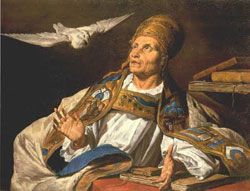 Born in Syria.
Born in Syria.Last Pope to be born (to date) outside of Europe. Died: 741. Priest at Saint Crisogono Church in Rome, Italy; except that his father's name was John, nothing else is known about his life prior to being elected 90th pope by popular acclamation in 731. Noted for his learning and virtue. The beginning of his pontificate was troubled by the excesses of the iconoclasts. He called a synod in November 731 to condemn iconoclasm; iconoclast leaders responded by seizing papal territories and assets, and insisting on the ecclesiastical allegiance to the Patriarch of Constantinople. The end of Gregory's reign was troubled by the invasions of the Lombards, against these he sought the help of Charles Martel, establishing ties with the French crown that would echo for centuries. Gregory promoted the Church in northern Europe, supporting the missions of Saint Boniface in Germany and Saint Willibald in Bohemia, bestowed palliums on Egbert of York and Saint Tatwine of Canterbury, beautified Rome, and supported monasticism in general. Prayer... Pope Saint Gregory III, it's hard to stand still and wait for God to do his work. Sometimes I doubt God's providence. I'm afraid that God's plan won't work out unless I push it along. Intercede for me, when I'm confused, to stop, pray, and wait for God. Amen. 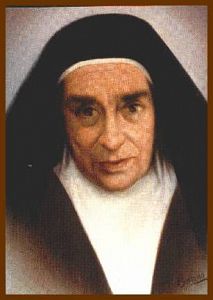 Born: 1891, Madrid, Spain.
Born: 1891, Madrid, Spain.Died: 1974. Daughter of Luis Pidal y Mon and Cristina Chico de Guzman y Munoz, the Marquess and Marchioness of Pidal; her father was Spanish ambassador to the Vatican and a very active supporter of the Church. She was baptized at the age of eight days, Confirmed in 1896, made her first Communion in 1902, grew up in a pious family, was known as an intelligent and religious child, and early perceived a call to religious life. She entered the Carmelite novitiate at El Escorial, Madrid, Spain in 1920. On 19 May 1924 Maria and three sisters founded a house at Cerro de los Angeles, Madrid, the geographical center of Spain, and she took her final vows there on 30 May 1924. Prioress of the house in 1926. The house expanded so quickly that Mother Marvillas was sent to found another in Kottayam, India, which over the years has expanded to many other Carmels in that country. She returned to Spain, and in 1936, as part of the anti-clerical actions of the Spanish Civil War, she and her sisters were arrested, relocated to Madrid, and subjected to fourteen months of house arrest and harassment. In September 1937 Mother Maravillas and her community relocated to las Batuecas, Salamanca, Spain where they founded a new house. In 1939 she led a group of sisters to restore the house at Cerro de los Angeles. From there she led an expansion of the Carmelites with houses in Mancera de Abajo, Salamanca in 1944, Duruelo, AviÂla in 1947, Cabrera, Salamanca 1950, Arenas de San Pedro, Avila in 1954, San Calixto, Cordoba in 1956, Aravaca, Madrid in 1958, Talavera de la Reina, Toledo c.1960, la Aldeheula, Madrid in 1961, and Montemar-Torremolinos, Milaga in 1964. To unite these and other far-flung houses, she founded the Association of Saint Teresa in 1972. The Carmel in la Aldeheula was hugely expanded with schools, a community of houses for the local poor, church, community halls and other structures in what effectively became a small town. In all these works Mother Maravillas was known for her dedication for work and prayer, her humility and care of her younger sisters, and her dedication to the Rules and spirituality of the Discalced Carmelites. Prayer... Lord God, Who drew St. Maria Maravillas of Jesus into the secrets of the Heart of Your Son, grant through her intercession and example, that we may work together for the salvation of souls, experiencing the delights of Your love. Through our Lord Jesus Christ Your Son, Who lives and reigns with You and the Holy Ghost one God for ever and ever. Amen.  Guadalupe is, strictly speaking, the name of a picture, but the name was extended to the church containing the picture and to the town that grew up around the church. It makes the shrine, it occasions the devotion, it illustrates Our Lady. It is taken as representing the Immaculate Conception, being the lone figure of a woman with the sun, moon, and star accompaniments of the great apocalyptic sign with a supporting angel under the crescent. The word is Spanish Arabic, but in Mexico it may represent certain Aztec sounds.
Guadalupe is, strictly speaking, the name of a picture, but the name was extended to the church containing the picture and to the town that grew up around the church. It makes the shrine, it occasions the devotion, it illustrates Our Lady. It is taken as representing the Immaculate Conception, being the lone figure of a woman with the sun, moon, and star accompaniments of the great apocalyptic sign with a supporting angel under the crescent. The word is Spanish Arabic, but in Mexico it may represent certain Aztec sounds.Its tradition is long-standing and constant, and in sources both oral and written, Indian and Spanish, the account is unwavering. The Blessed Virgin appeared on Saturday December 9, 1531 to a 55 year old neophyte named Juan Diego, who was hurrying down Tepeyac hill to hear Mass in Mexico City. She sent him to Bishop Zumarraga to have a temple built where she stood. She was at the same place that evening and Sunday evening to get the bishop's answer. The bishop did not immediately believed the messenger, had him cross-examined and watched, and he finally told him to ask the lady who said she was the mother of the true God for a sign. The neophyte agreed readily to ask for sign desired, and the bishop released him. Juan was occupied all Monday with Bernardino, an uncle, who was dying of fever. Indian medicine had failed, and Bernardino seemed at death's door. At daybreak on Tuesday December 12, 1531, Juan ran to nearby the Saint James convent for a priest. To avoid the apparition and the untimely message to the bishop, he slipped round where the well chapel now stands. But the Blessed Virgin crossed down to meet him and said, "What road is this you take son?" A tender dialogue ensued. She reassured Juan about his uncle, to whom she also briefly appeared and instantly cured. Calling herself Holy Mary of Guadalupe she told Juan to return to the bishop. He asked Mary for the sign he required. She told him to go to the rocks and gather roses. Juan knew it was neither the time nor the place for roses, but he went and found them. Gathering many into the lap of his tilma, a long cloak or wrapper used by Mexican Indians, he came back. The Holy Mother rearranged the roses, and told him to keep them untouched and unseen until he reached the bishop. When he met with Zumarraga, Juan offered the sign to the bishop. As he unfolded his cloak the roses, fresh and wet with dew, fell out. Juan was startled to see the bishop and his attendants kneeling before him. The life size figure of the Virgin Mother, just as Juan had described her, was glowing on the tilma. The picture was venerated, guarded in the bishop's chapel, and soon after carried in procession to the preliminary shrine. The coarsely woven material of the tilma which bears the picture is as thin and open as poor sacking. It is made of vegetable fiber, probably agave plant. It consists of two strips, about seventy inches long by eighteen wide, held together by weak stitching. The seam is visible up the middle of the figure, turning aside from the face. Painters have not understood the laying on of the colors. They have deposed that the "canvas" was not only unfit but unprepared, and they have marveled at apparent oil, water, tempera, etc. coloring in the same figure. They are left in equal admiration by the flower-like tints and the abundant gold. They and other artists find the proportions perfect for a maiden of fifteen. The figure and the attitude are of one advancing. There is flight and rest in the eager supporting angel. The chief colors are deep gold in the rays and stars, blue-green in the mantle, and rose in the flowered tunic. Sworn evidence was given at various commissions of inquiry corroborating the traditional account of the miraculous origin and influence of the picture. Some wills connected with Juan Diego and his contemporaries were accepted as documentary evidence. Vouchers were given for the existence of Bishop Zumarraga's letter to his Franciscan brothers in Spain concerning the apparitions. His successor, Montufar, instituted a canonical inquiry, in 1556, on a sermon in which the pastors and people were abused for crowding to the new shrine. In 1568 the renowned historian Bernal Diaz, a companion of Cortez, refers incidentally to Guadalupe and its daily miracles. The lay viceroy, EnrÃÂquez, while not opposing the devotion, wrote in 1575 to Philip II asking him to prevent the third archbishop from erecting a parish or monastery at the shrine. Inaugural pilgrimages were usually made to it by viceroys and other chief magistrates. Processes, national and ecclesiastical, were laboriously formulated and attested for presentation at Rome, Italy in 1663, 1666, 1723, and 1750. The clergy, secular and regular, has been remarkably faithful to the devotion towards Our Lady of Guadalupe, the bishops especially fostering it, even to the extent of making a protestation of faith in the miracle a matter of occasional obligation. Pope Benedict XIV decreed that Our Lady of Guadalupe should be the national patron of Mexico, and made 12 December a holiday of obligation with an octave, and ordered a special Mass and Office. Pope Leo XIII approved a complete historical second Nocturne, ordered the picture to be crowned in his name, and composed a poetical inscription for it. Pope Pius X permitted Mexican priests to say the Mass of Holy Mary of Guadalupe on the twelfth day of every month, and granted indulgences which may be gained in any part of the world for prayer before a copy of the picture. The place, called Guadalupe Hidalgo since 1822, is three miles northeast of Mexico City. Pilgrimages have been made to this shrine almost without interruption since 1531-1532. A shrine at the foot of Tepeyac Hill served for ninety years, and still forms part of the parochial sacristy. In 1622 a rich shrine was erected, and in 1709 a newer, even richer one. There are also a parish church, a convent and church for Capuchin nuns, a well chapel, and a hill chapel all constructed in the 18th century. About 1750 the shrine got the title of collegiate, a canonry and choir service being established. It was aggregated to Saint John Lateran in 1754. In 1904 it was created a basilica, with the presiding ecclesiastic being called abbot. The shrine has been renovated in Byzantine style which presents an illustration of Guadalupan history. Prayer... O God, Father of mercies, who placed your people under the singular protection of your Son's most holy Mother, grant that all who invoke the Blessed Virgin of Guadalupe, may seek with ever more lively faith the progress of peoples in the ways of justice and of peace. Through our Lord Jesus Christ, your Son, who lives and reigns with you in the unity of the Holy Spirit, one God, for ever and ever. Amen 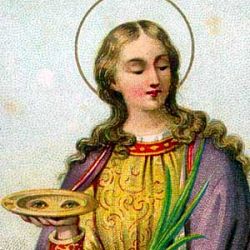 Born: 283.
Born: 283.Martyred, stabbed in the throat, 304. (Patroness of the blind and of eye problems) Rich, young Christian of Greek ancestry. Raised in a pious family, she vowed her life to Christ. Her Roman father died when she was young. Her mother, Eutychia, arranged a marriage for her. For three years she managed to keep the marriage on hold. To change the mother's mind about the girl's new faith, Lucy prayed at the tomb of Saint Agatha, and her mother's long hemorrhagic illness was cured. Her mother agreed with Lucy's desire to live for God, and Lucy became known as a patron of those with maladies like her mother's. Her rejected pagan bridegroom, Paschasius, denounced Lucy as a Christian to the governor of Sicily. The governor sentenced her to forced prostitution, but when guards went to fetch her, they could not move her even when they hitched her to a team of oxen. The governor ordered her killed instead. After torture that included having her eyes torn out, she was surrounded by bundles of wood which were set afire; they went out. She prophesied against her persecutors, and was executed by being stabbed to death with a dagger. Her name is listed in the prayer "Nobis quoque peccatoribus" in the Canon of the Mass. Legend says her eyesight was restored before her death. This and the meaning of her name led to her connection with eyes, the blind, eye trouble, etc. Prayer... Relying on Your goodness, O God, we humbly ask You, through the intercession of Saint Lucy, Virgin and Martyr, to give perfect vision to our eyes, that they may serve for Your greater honor and glory. Saint Lucy, hear our prayers and obtain our petitions. Amen. 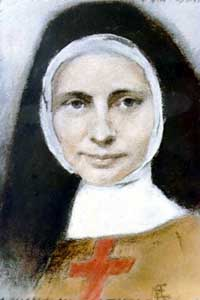 1819-1876.
1819-1876.Born & died in Aachen, Germany. Daughter of Johann Heinrich Schervier, a wealthy needle-factory owner and vice-mayor of Aachen, and Maria Louise Migeon; god-daughter of Emperor Francis I of Austria. She ran her father's household at age 16 after the death of her mother and two older sisters to tuberculosis, and had a reputation for generosity to the poor. In 1844 she became a Secular Franciscan, and in 1845 she and four companions established a religious community devoted to caring for the poor. This group, Sisters of the Poor of Saint Francis, was approved by their bishop on 2 July 1851. Their first community in the United States was founded 1858, and Mother Frances visited in 1863 to help her sisters nurse wounded Civil War soldiers. She visited the United States again in 1868, encouraging Philip Hoever in his establishment of the Brothers of the Poor of Saint Francis, and overseeing the foundation of several hospitals. Cured of asthma in 1870 by making a pilgrimage to the healing waters of Lourdes. When Mother Frances died there were 2,500 members of her community worldwide, and the numbers continue to grow as they operate hospitals and homes for the aged. "You are my friends if you do what I command you.... I am giving you these commands so that you may love one another." (John 15:14,17) If we do this faithfully and zealously, we will experience the truth of the words of our father Saint Francis who says that love lightens all difficulties and sweetens all bitterness. We will likewise partake of the blessing which Saint Francis promised to all his children, both present and future, after having admonished them to love one another even as he had loved them and continues to love them." - Mother Mary Frances, 1868, writing to her sisters 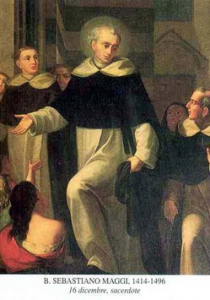 Italian.
Italian.1414-1496, body was still incorrupt in 1963 Joined the Dominicans in Brescia at age 15 in 1429, the youngest that he could, and spent the next 67 years as a zealous and reforming friar. Superior of several Dominican houses. Vicar of a reformed congregation of Lombardy. Known for his personal strict adherence to the rules, and his gentle ways with those who could not live so strictly. Died while en route to a convent for a mission. Prayer... God of faithfulness, you made Blessed Sebastian and outstanding example of evangelical perfection and truth. By following his example may we enter the path to perfect charity and deepen the life of the spirit through penance and so obtain your glory and eternal life. Amen. 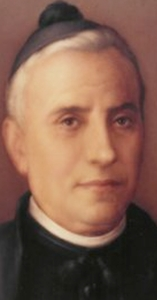 Spanish.
Spanish.1833-1901 Born to a large and pious family. Dedicated to Our Lady at age 5 by his mother. Educated by the Piarist Fathers in Barbastro. Trained in seminaries at Lleida and Urgell. Ordained on 9 April 1859. Private secretary to the bishop of Urgell. Seminary librarian. Chancery administrator. Secretary for pastoral visitations. Founded the Congregation of the Sons of the Holy Family in 1864. Founded the Missionary Daughters of the Holy Family of Nazareth in 1874. Both were dedicated to serving Christian family, teaching, and parish ministry, and today work throughout Europe, Africa, and the Americas. Founded schools and ministerial centers in several Spanish towns. Wrote books and pamphlets encouraging devotion to the Holy Family, to help the spiritual formation of the members of his congregations, to help families in trouble, and about school management. Founded the magazine La Sagrada Familia. Worked for the construction of a temple in Barcelona dedicated to the Holy Family, which was built by Servant of God Antonio Gaudi. "The Holy Spirit, whom the Father will send in my name, will teach you everything and remind you of all that I told you." (John 14: 26) From the beginning, the Holy Spirit has brought forth men and women who have remembered and spread the truth revealed by Jesus. One of these was Saint Jose Manyanet, a true apostle of the family. Inspired by the school of Nazareth, he carried out his plan of personal sanctity and heroically devoted himself to the mission that the Spirit entrusted to him. He founded two religious congregations. A visible symbol of his apostolic zeal is also the temple of the Holy Family of Barcelona. May Saint Jose Manyanet bless all families and help them follow the example of the Holy Family in their homes!" - Pope John Paul II's canonization homily for Saint Jose  Born: 7th century in Thomond, Ireland
Born: 7th century in Thomond, IrelandSon of an Irish chieftain named Turdough. Intellectual and spiritual student of the monk Saint Molua. Despite family opposition, he became a monk. Missionary monk throughout Ireland, Scotland, and the Hebrides. First bishop of Killaloe, Ireland, consecrated by Pope John IV. Recited the entire Psalter daily. His preaching was so persuasive that his own father gave up power to become a monk. St. Flannan, pray for us! 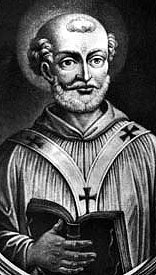 Born: 4th Century in Rome, Italy.
Born: 4th Century in Rome, Italy.All that is known of his early life is that he was considered pious as a youth, and cared nothing for material things as an adult. Pope. Fought against the heresy of Donatism. St. Anastasius was a friend of the great Fathers of the Church, St. Augustine, St. Jerome, and St. Paulinus. St. Paulinus of Nola. St. Anastasius died in December 401 with the empire on the brink of disaster. St. Jerome says that he was a man of apostolic zeal and great poverty, and that Rome did not deserve to possess him long lest the world's head be cut off while ruled by such a bishop. Pope St. Anastasius I, pray for us! 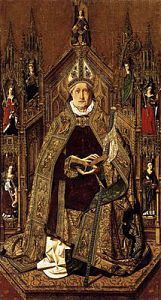 1000-1073
1000-1073Benedictine abbot and defender of the faith. Born in Canas, Navarre, Spain, circa 1000, he entered the Benedictines at San Millan de Ia Cogolla. King Garcia III of Navarre challenged him when he became abbot of the monastery, and Dominic refused to surrender part of the Benedictine lands to the crown. For this he was exiled, going to King Ferdinand I of Castile and Leon, who made him abbot of St. Sebastian Abbey at Silos, now called St. Dominic's. Dominic reformed the abbey, built the cloisters in Romanesque style, and started a scriptorium that became famous throughout the region. One of the most beloved saints in Spain, Dominic also rescued Christian slaves from the Moors. Dominic's shrine is noted for its place in the birth of Dominic de Guzman, the founder of the Order of Preachers. Dominic de Guzman's mother begged for a child there. Dominic was also noted for miracles of healing. St. Dominic of Silos, pray for us! 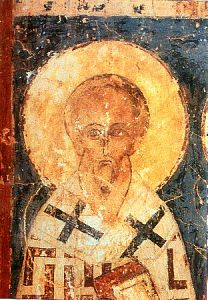 Martyred in 251 at Ceasarea.
Martyred in 251 at Ceasarea.Studied in Alexandria, Egypt. Fellow student with Origen. Bishop of Cappadocia. Imprisoned from 204 to 211 for his faith during the persecutions of Severus. Pilgrim to Jerusalem upon his release. Coadjutor bishop of Jerusalem with Saint Narcissus in 212. Censured for encouraging Origen to teach in churches while still a laymen. Developed a large theological library. Imprisoned again during the persecutions of Decius. When given a chance to save himself by denouncing Christianity, he made a public pronouncement of his faith. He was thrown to wild animals, but they refused to attack him. Re-imprisoned, Alexander died in chains from general maltreatment. Martyr. St. Alexander of Jerusalem, pray for us! 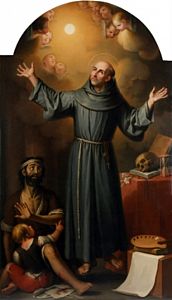 Born: 1520
Born: 1520Died: 1582 Son of a tailor. Joined the Franciscans in 1537. Well-known, highly admired and sought after itinerant preacher throughout the region. Mystic and visionary. Friend of Saint Pascal Baylon, Saint Louis Bertrand and Saint John de Ribera each of whose testimony was used in Nicholas' beatification investigation. Blessed Nicholas Factor, pray for us! 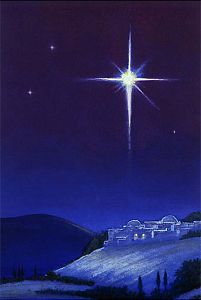 Loving God, Help us remember the birth of Jesus, that we may share in the song of the angels, the gladness of the shepherds, and worship of the wise men.
Loving God, Help us remember the birth of Jesus, that we may share in the song of the angels, the gladness of the shepherds, and worship of the wise men.Close the door of hate and open the door of love all over the world. Let kindness come with every gift and good desires with every greeting. Deliver us from evil by the blessing which Christ brings, and teach us to be merry with clear hearts. May the Christmas morning make us happy to be thy children, and Christmas evening bring us to our beds with grateful thoughts, forgiving and forgiven, for Jesus' sake. Amen. Robert Louis Stevenson 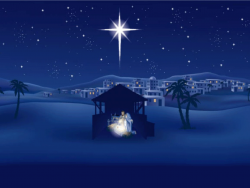 Merry Christmas!
Merry Christmas!"Not Only Christmas Day" Lord, this is my prayer Not only on Christmas Day But until I see You face to face May I live my life this way: Just like the baby Jesus I ever hope to be, Resting in Your loving arms Trusting in Your sovereignty. And like the growing Christ child In wisdom daily learning, May I ever seek to know You With my mind and spirit yearning. Like the Son so faithful Let me follow in Your light, Meek and bold, humble and strong Not afraid to face the night. Nor cowardly to suffer And stand for truth alone, Knowing that Your kingdom Awaits my going home. Not afraid to sacrifice Though great may be the cost, Mindful how You rescued me From broken-hearted loss. Like my risen Savior The babe, the child, the Son, May my life forever speak Of who You are and all You've done. So while this world rejoices And celebrates Your birth, I treasure You, the greatest gift Unequaled in Your worth. I long to hear the same words That welcomed home Your Son, "Come, good and faithful servant," Your Master says, "Well done." And may heaven welcome others Who will join with me in praise Because I lived for Jesus Christ Not only Christmas Day -- Mary Fairchild 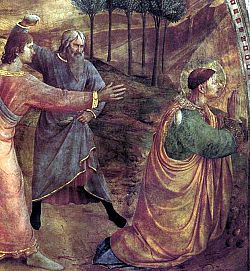 First Christian martyr. Deacon. Preacher. All we know of him is related in the Acts of the Apostles. While preaching the Gospel in the streets, angry Jews who believed his message to be blasphemy dragged him outside the city, and stoned him to death. In the crowd, on the side of the mob, was a man who would later be known as Saint Paul the Apostle.
First Christian martyr. Deacon. Preacher. All we know of him is related in the Acts of the Apostles. While preaching the Gospel in the streets, angry Jews who believed his message to be blasphemy dragged him outside the city, and stoned him to death. In the crowd, on the side of the mob, was a man who would later be known as Saint Paul the Apostle. "At that time, as the number of disciples continued to grow, the Hellenists complained against the Hebrews because their widows were being neglected in the daily distribution. So the Twelve called together the community of the disciples and said, "It is not right for us to neglect the word of God to serve at table. Brothers, select from among you seven reputable men, filled with the Spirit and wisdom, whom we shall appoint to this task, whereas we shall devote ourselves to prayer and to the ministry of the word." The proposal was acceptable to the whole community, so they chose Stephen, a man filled with faith and the Holy Spirit.... Now Stephen, filled with grace and power, was working great wonders and signs among the people. Certain members of the so-called Synagogue of Freedmen, Cyrenians, and Alexandrians, and people from Cilicia and Asia, came forward and debated with Stephen, but they could not withstand the wisdom and the spirit with which he spoke. Then they instigated some men to say, "We have heard him speaking blasphemous words against Moses and God." They stirred up the people, the elders, and the scribes, accosted him, seized him, and brought him before the Sanhedrin. They presented false witnesses who testified, "This man never stops saying things against (this) holy place and the law. For we have heard him claim that this Jesus the Nazorean will destroy this place and change the customs that Moses handed down to us." All those who sat in the Sanhedrin looked intently at him and saw that his face was like the face of an angel. Stephen preaches to the Sanhedrin, concluding: "You stiff-necked people, uncircumcised in heart and ears, you always oppose the Holy Spirit; you are just like your ancestors. Which of the prophets did your ancestors not persecute? They put to death those who foretold the coming of the righteous one, whose betrayers and murderers you have now become. You received the law as transmitted by angels, but you did not observe it." When they heard this, they were infuriated, and they ground their teeth at him. But he, filled with the Holy Spirit, looked up intently to heaven and saw the glory of God and Jesus standing at the right hand of God, and he said, "Behold, I see the heavens opened and the Son of Man standing at the right hand of God." But they cried out in a loud voice, covered their ears, and rushed upon him together. They threw him out of the city, and began to stone him. The witnesses laid down their cloaks at the feet of a young man named Saul. As they were stoning Stephen, he called out, "Lord Jesus, receive my spirit." Then he fell to his knees and cried out in a loud voice, "Lord, do not hold this sin against them"; and when he said this, he fell asleep." - Acts 6:1-15, 7:51-60 Lord, we celebrate the entrance of St. Stephen into eternal glory. He died praying for those who killed him. Help us to imitate his goodness and to love our enemies. We ask this through our Lord Jesus Christ, your Son, who lives and reigns with you and the Holy Spirit, one God, for ever and ever. Amen. 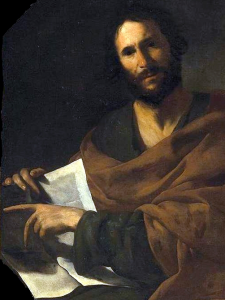 Died c. 101 in Ephesus. Modern Turkey.
Died c. 101 in Ephesus. Modern Turkey.Son of Zebedee and Salome. Fisherman. Brother of Saint James the Greater, and called one of the Sons of Thunder. Disciple of Saint John the Baptist. Friend of Saint Peter the Apostle. Called by Jesus during the first year of His ministry, and traveled everywhere with Him, becoming so close as to be known as the beloved disciple. Took part in the Last Supper. The only one of the Twelve not to forsake the Saviour in the hour of His Passion, standing at the foot of the cross. Made guardian of Our Lady by Jesus, and he took her into his home. Upon hearing of the Resurrection, he was the first to reach the tomb; when he met the risen Lord at the lake of Tiberias, he was the first to recognize Him. During the era of the new Church, he worked in Jerusalem and at Ephesus. During Jesus' ministry, he tried to block a Samaritan from their group, but Jesus explained the open nature of the new Way, and he worked on that principle to found churches in Asia Minor and baptizing converts in Samaria. Imprisoned with Peter for preaching after Pentecost. Wrote the fourth Gospel, three Epistles, and possibly the Book of Revelation. Survived all his fellow apostles. Prayer... Saint John, you were so loved by Jesus that you merited to rest your head upon his breast, and to be left in his place as a son to Mary. Obtain for us an ardent love for Jesus and Mary. Let me be united with them now on earth and forever after in heaven. Amen. 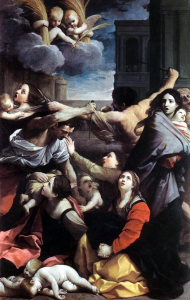 "The children die for Christ, though they do not know it. The parents mourn for the death of martyrs. The Christ child makes of those as yet unable to speak fit witnesses to himself. But you, Herod, do not know this and are disturbed and furious. While you vent your fury against the child, you are already paying him homage, and do not know it.
"The children die for Christ, though they do not know it. The parents mourn for the death of martyrs. The Christ child makes of those as yet unable to speak fit witnesses to himself. But you, Herod, do not know this and are disturbed and furious. While you vent your fury against the child, you are already paying him homage, and do not know it.To what merits of their own do the children owe this kind of victory? They cannot speak, yet they bear witness to Christ. They cannot use their limbs to engage in battle, yet already they bear off the palm of victory." - from a sermon by bishop St. Quodvultdeus about the Holy Innocents Prayer... O God, whom the Holy Innocents confessed and proclaimed on this day, not by speaking but by dying, grant, we pray, that the faith in your which we confess with our lips may also speak through our manner of life. Pour forth, we beseech you, O Lord, your grace into our hearts, that we, to whom the Incarnation of Christ your Son was made known by the message of an Angel, may by his Passion and Cross be brought to the glory of his Resurrection. Through our Lord Jesus Christ, your Son, who lives and reigns with you in the unity of the Holy Spirit, one God, for ever and ever. Amen. 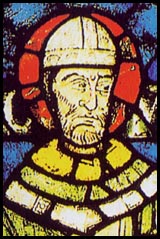 Born: 1118 in London, England.
Born: 1118 in London, England.Murdered in the Cathedral, in Cantebury, England, 1170. Of Norman ancestry. Educated at Merton Priory, Paris, Bologna, and Auxerre. Civil and canon lawyer. Soldier and officer. Archdeacon of Canterbury. Friend of King Henry II. Chancellor of England. Ordained on 2 June 1162 and appointed archbishop of Canterbury on 3 June 1162. Opposed the King's interference in ecclesiastical matters. Exiled several times. Martyr. "Remember the sufferings of Christ, the storms that were weathered...the crown that came from those sufferings which gave new radiance to the faith...All saints give testimony to the truth that without real effort, no one ever wins the crown." - Thomas Becket 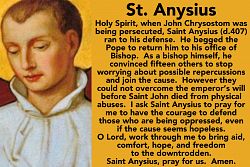 Death, 407.
Death, 407.Bishop successor of St. Ascolus in the see of Salonika, in Greece. A friend of St. Ambrose, Anysius was appointed bishop in 383. Pope Damasus also named him vicar apostolic of Illyricum. A loyal defender of St. John Chrysostom, Anysius was one of the sixteen Macedonian bishops to appeal to Pope Innocent in 404 on St. John's behalf. 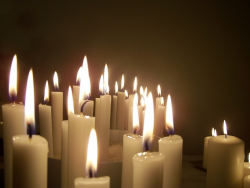 New Year's Eve Prayer....
New Year's Eve Prayer....A new year coming and God is with us In loving, in caring, in hoping and expecting, God is with us and never lets us go God live in us, God live with us, God live through us God keep us faithful through the days that lie ahead God keep us caring as we see the pain that fills your world God keep us serving as we seek to do your will God live in us, God live with us, God live through us God keep us loving toward neighbors near and far God keep us trusting through the uncertainties of life God keep us sharing from your generous abundance God live in us, God live with us, God live through us Amen. |




